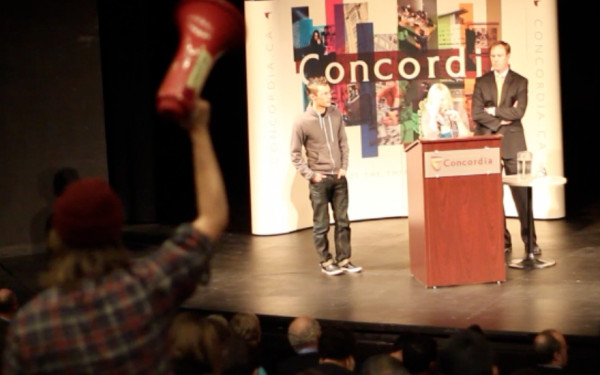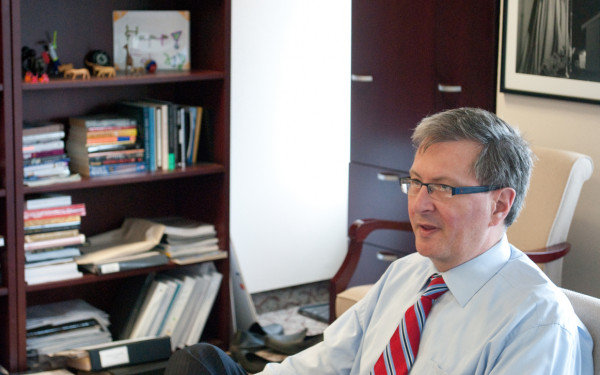CATs Welcome Concordia President
Students Interrupt Alan Shepard Meet and Greet
Concordia president Alan Shepard stands nervously, surrounded by a crowd of students.
Thursday was supposed to be a simple back-to-school welcoming event, one that was billed as an opportunity to “meet with members of our community,” according to the email that was sent out last week. A bit of food, and some schmoozing.
Inside the Richard J. Renaud Science Complex (SP building) on Loyola campus, Shepard is instead standing in front of a small crowd of sign-wielding students, nearly all of whom are wearing identical patches that read “CATs.”
These students are part of a new campaign called Concordia Against Tribunals, or CATs for short.
The CATs campaign is a response to events that have been unfolding since last spring, when a wave of anti-austerity strikes swept the universities of Quebec, including Concordia, where multiple departmental student associations voted to go on strike.
20 minutes earlier, this group of 10 students had been on the Concordia shuttle bus, going from the downtown Sir George Williams campus to the Loyola campus, where the meet-and-greet was taking place. They made plans for how they would react under different circumstances, as a group.
Following the strikes last semester, three professors in the political science department—whose students had voted for two days of strikes—decided to press charges under the university’s Code of Rights and Responsibilities against about 25 students for holding picket lines. Concordia’s administration later backed the charges, and became a co-complainant alongside the professors.
Up to now, the tribunals have taken place for eight students, all of whom were given letters of reprimand. The remaining tribunals are expected to finish this spring.
The CATs campaign, according to its website, has two demands. The first is that all charges be dropped immediately, by both the university and the professors.
The second is a demand for reparations, including a letter of apology, amnesty for all students, and support for the mental health of students who have been put through the tribunals.
On Thursday, a group of students who had helped formulate the demands decided to formally give them to Alan Shepard. Hayley Currier, a participant in the action, says that the public-surprise tactic was chosen after Shepard refused to meet protesters who waited for him outside his office for hours last spring. She says that this way, he would definitely see them, although he “might be a little surprised.”
Upon entering the SP building where the meet-and-greet was taking place, the students were greeted by a security guard, who attempted to block their entrance to the atrium. More guards rushed to the entrance. Some shouting ensued, and a guard was able to snatch one of the placards from a protester.
“I wasn’t expecting them to be keen on our actions, but I really didn’t expect them to be so aggressive just because of signs,” said Eamon Toohey, another participant. That’s when “another security guard, who appeared to be in charge, ordered the rest to stand down,” Toohey says. From there, the group was able to enter the atrium.
One group gave out pamphlets to event attendees, while the other attempted to give Alan Shepard a copy of their demands—which had been written on a Bristol board that had been given cut-out cat ears and whiskers. About 30 students and faculty members were at the meet-and-greet event. Around 10 people were wearing t-shirts by the Teaching and Research Assistants at Concordia (TRAC), a union which is currently at a stalemate with the university in negotiations over pay increases.
“Their signs were really creative, we do have a really creative student body at Concordia,” Shepard said after they had left.
“Their signs were really creative, we do have a really creative student body at Concordia,” — President Alan Shepard
He refused to take the copy of the demands. The students left the atrium, chanting “hey-hey, ho-ho, the tribunals have got to go!” They retrieved the sign that the guard had taken from them.
Afterward, when asked for a comment on what had happened, Shepard said that “the tribunals are an independent process,” and that he did not create it. He refused to comment on the university’s role as co-complainant in the cases.
“The university should expect actions like this to continue until the charges are dropped, and the climate of repression is lifted,” said Eamon Toohey.

_900_675_90.jpg)


_600_375_90_s_c1.jpg)


_1_600_375_90_s_c1.jpg)